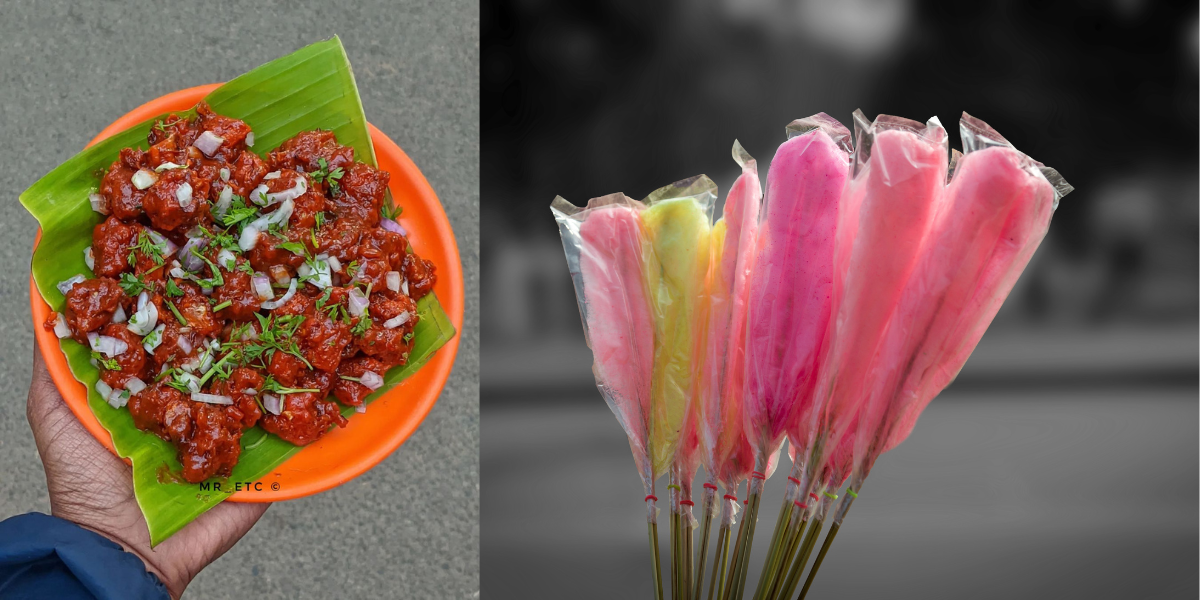Health Minister Gundu Rao warned cotton candy makers and restaurants making gobi manchurian of jail time if found using colouring agents.

Gobi manchurian (Mr_Etc/Instagram); cotton candy (Getty Images)
On Monday, 11 March, Karnataka made the bold announcement of placing a ban on coloured cotton candy. This echoes the proactive steps taken by Tamil Nadu and Puducherry, that have outlawed these sugary delights due to the presence of Rhodamine B, a hazardous textile dye and chemical compound unsuitable for consumption.
Karnataka Health Minister Dinesh Gundu Rao, addressing the media, underscored the government’s vigilance against chemical adulteration in food products. “Our focus is on two products: cotton candy and gobi manchurian, as there are reports of chemicals in these two,” he declared.
Upon inspection, samples revealed the presence of Rhodamine B and other chemicals in numerous cotton candy samples. In the case of gobi manchurian, the unauthorised use of Tartrazine, a chemical unfit for consumption, was exposed.
Minister Gundu Rao issued a stern warning, “We have taken this matter seriously. The misuse of such chemicals will not be tolerated. A notification today empowers us to take swift and strict action against any such violations.”
Additionally, Telangana and Kerala are also likely to place a ban on cotton candy after samples tested positive for Rhodamine B.
Speaking to South First earlier, Dr Akhil Raj, Neurosurgeon and Head Researcher at Nonpareil Centre for Neuro and Psychosomatic Development, explained that Rhodamine B is not just another food colouring agent. It is a chemical that is primarily used in industrial applications, including as a tracer dye in water and a colourant in textiles and plastics.
“The fine bright colour that Rhodamine B gives is what has attracted the food industry and hence, it is used not only in cotton candy but several other foods. This is not approved for food use by food safety authorities,” he had said.
Rhodamine B’s presence in food can even cause developmental delay in children, Dr Raj explained.
He said that this agent and its metabolites cause oxidative stress, leading to degeneration in the parts of the brain. The effect on the cerebellum can lead to various abnormalities.
The doctor added that aside from cotton candy, Rhodamine B is likely present in several sauces — tomato ketchup, red chilli sauce, Szechuan sauce. He urged the Food Safety Department to check these as well.
Gundu Rao explained that the Food Safety Department in Bengaluru collected 171 food samples from various establishments in the city — including roadside eateries and three-star hotels. Shockingly, 107 of these were deemed unsafe, thanks to the use of artificial colours and chemicals. The use of Rhodamine B and Tartrazine in cotton candy and gobi manchurian, respectively, was confirmed through laboratory tests.
The Food Safety Department officials collected 25 cotton candy samples and tested them, and found that 15 samples contained artifiicial colouring agents — Tartrazine in five samples, Sunset Yellow in four, and Rhodamine B in six samples. As per the Food Safety and Standards Act, 2006, the use of these agents is considered as “substandard and unsafe”.
Speaking about gobi manchurian, he warned that the use of food colouring agent Tartrazine was found in samples collected from several eateries and restaurants.
As per the Food Products Standards and Food Additives Rules, the use of food colouring agents beyond the permitted limit can cause severe health issues. “Officials have found that the samples collected showed use of harmful colouring agents and hence, it is a stern warning to manufacturers of cotton candy to not use any coloured agent. If used, they will be booked legally under the Act,” Gundu Rao said.
In consideration of public health, we are banning the use of artificial colours in Gobi Manchurian and cotton candy. Violation of this ban may result in imprisonment for up to 7 years and a fine of up to 10 lakhs.
Following reports of substandard quality and the presence of… pic.twitter.com/z2KWHi8Jbd
— Dinesh Gundu Rao/ದಿನೇಶ್ ಗುಂಡೂರಾವ್ (@dineshgrao) March 11, 2024
Gundu Rao clarified that the sale of cotton candy and gobi manchurian without any colouring agent would be permitted in Karnataka.
“Cotton candy that is white in colour can be sold but not any coloured ones,” the Health Minister said.
Meanwhile, he announced that several drives will be conducted across the city and if the use of such chemicals or colouring agents are found, then the perpetrators would be severely punished under the law, the Minister warned.
In case of any violations of the Food Safety and Standards Act 2006, the department can file a case which can lead to imprisonment — seven years to life — and a fine up to ₹10 lakh, officials said.
The order further stated that “prolonged usage of artificial colours in food and its consumption can lead to deadly diseases like cancer”. So, the public have been advised not to use any artificial colours in food or to use them in limited quantities.
Gundu Rao urged not only vendors but also the general public to be aware of such harmful chemicals in food, and be alert when consuming these kind of foods with artifical colouring agents.
Appreciative of the government’s stand, doctors are now advising the government to look into foods like jalebi, tomato ketchup, kebabs, etc, as these foods are also likely to contain colouring agents to make them look more appetising.
(Edited by Kamna Revanoor)

Jul 26, 2024

Jul 26, 2024

Jul 26, 2024

Jul 26, 2024

Jul 26, 2024

Jul 26, 2024